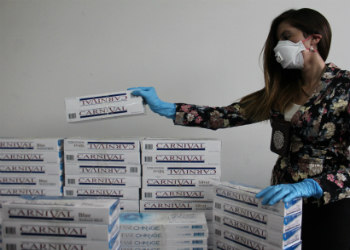A new report indicates that Chile’s contraband cigarette trade has increased exponentially during the past five years, a reminder of how profitable the illegal industry is for organized crime groups.
The amount of illegal cigarettes traded in Chile has increased by 386 percent since 2012, according to a report by the Observatory on Illicit Trade (Observatorio del Comercio Ilícito – OCI), which is part of Chile’s National Chamber of Commerce, Services and Tourism.
By the end of 2016, the study estimated that 15.4 percent of all cigarettes in Chile were illegal, and that the illicit trade resulted in over $290 million in lost tax revenue every year.
Santiago is home to an estimated 15 percent of all illegal cigarettes in the country, but cities in the north are also centers for contraband. For instance, in the port of Arica, the OCI report estimates that 84.1 percent of all traded cigarettes are of illicit origen.
Not only does the unlawful trade represent a threat to legal businesses, it also appears to be linked to sophisticated criminal networks.
“We are worried about the way in which these products enter our country, which is through contraband … a phenomenon directly linked with the financing of terrorism,” said OCI representative Jorge Lee in comments reported by BioBio.
Indeed, the illegal cigarettes trade “very often constitutes the last step in the chain of transnational criminal networks,” Lee added.
An estimated 78 percent of all illegal cigarettes in Chile come from three brands: Fox, based in Paraguay; Pine, based in South Korea; and Jaisalmer, based in India.
InSight Crime Analysis
Cigarette contraband may not be as notorious as other criminal activities, but it does represent an enormous revenue source for organized crime in Latin America. According to estimates cited in 2014 by the US military publication Diálogo, the illicit cigarette trade combined with the trade in contraband alcohol could be worth billions of dollars per year for regional crime groups.
In addition, the fact that Paraguay accounts for so many of the illegal cigarettes traded in Chile is not surprising. As InSight Crime has previously noted, Paraguayan contraband cigarettes have been a key revenue source for organized crime groups across the region.
SEE ALSO: Coverage of Contraband
In Mexico, for instance, black market cigarettes from Paraguay have been financing criminal groups like the Zetas and the Sinaloa Cartel. In Colombia, the illicit tobacco trade has reportedly been used to launder drug money by the 59th and 19th Fronts of the Revolutionary Armed Forces of Colombia (Fuerzas Armadas Revolucionarias de Colombia – FARC) as well as by a criminal group led by Marcos Figueroa, alias “Marquitos,” who is now believed to be part of the Urabeños criminal organization.

